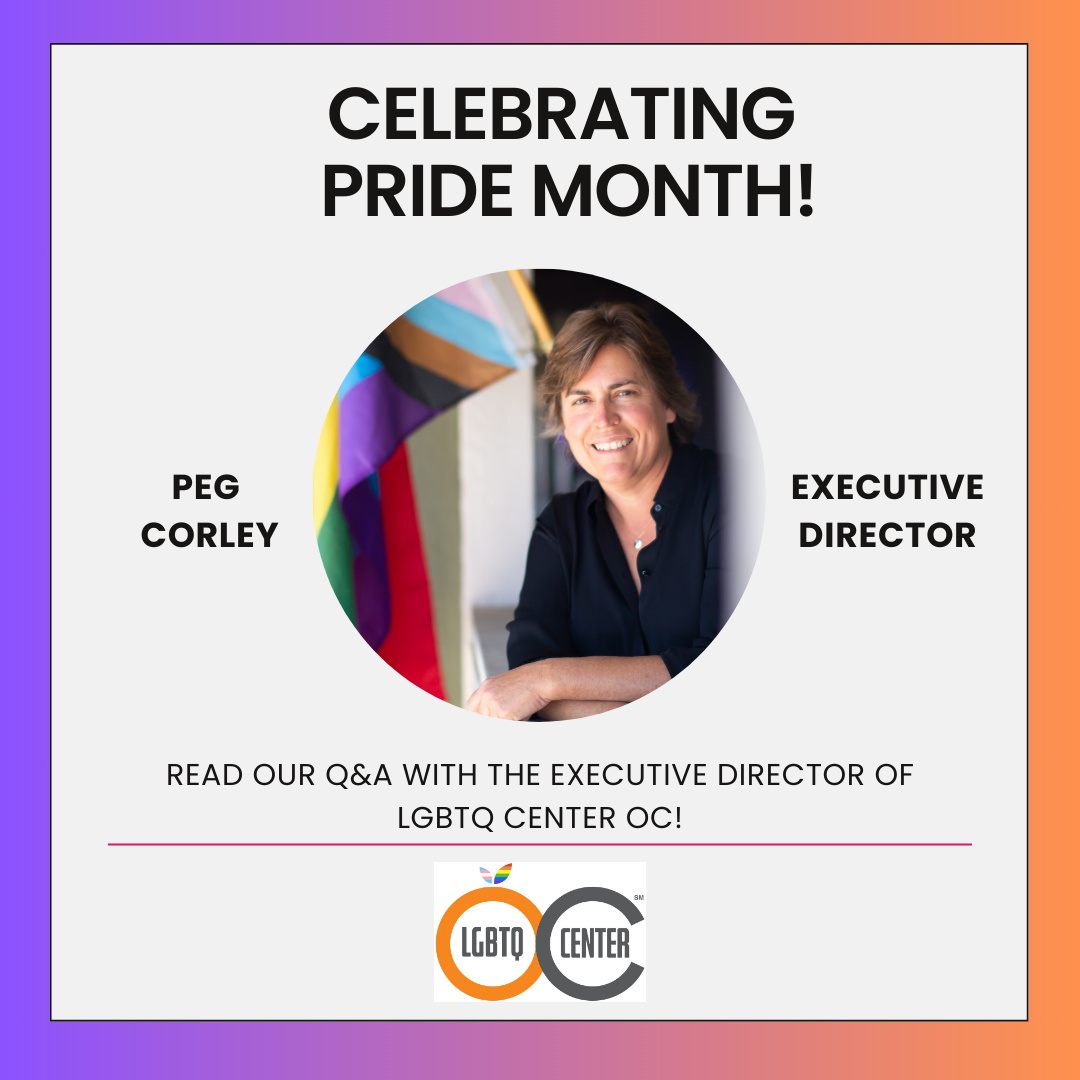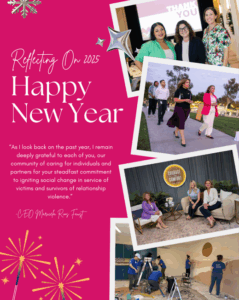As we consider how to be better allies with the LGBTQ+ community, our CEO Maricela Rios-Faust spoke to Peg Corley, Executive Director of the Center OC to help us understand how to further focus on the experiences of the LGBTQ+ community in accessing services. Established in 1975, the LGBTQ Center OC’s mission is to advocate on behalf of the Orange County Lesbian Gay Bisexual Transgender and Queer/Questioning communities and provide services that ensure its well-being and positive identity. Here is what she had to say:
What does being an ally mean to you?
I think of “Ally” as being an action word. You’ve got to be doing something in order to be a true Ally. If you merely support a marginalized community in your ideals and way of thinking, then you’re a well-meaning bystander. Allies – especially explicit allies, make an effort to educate themselves about marginalized communities, the issues and challenges they face, to understand the real and potential threats to the autonomy of individuals within the community, then lift their voices (and votes) to counter those threats. Explicit allies utilize both their platform and their privilege to elevate the importance of equity for all.
How does the Center OC specifically support individuals in the LGBTQ+ community who are experiencing relationship violence?
The LGBTQ Center OC is a trusted provider with a robust mental health counseling department. We conduct roughly 7,000 LGBTQ+ affirming counseling sessions each year. Sessions are offered to individuals, couples, families, and to a variety of support groups. Beyond addressing the emotional distress and coping mechanisms related to relationship violence, we refer our clients who are experiencing relationship violence to LGBTQ+ affirming community partners such as Human Options, where they can get the help they need to get their life back on track.
How does the intersection of different identities (e.g., race, SES) affect the experiences of the LGBTQ+ individuals access services for relationship violence?
This is a great question because the intersectionality of multiple identities plays a major role in the marginalization of individuals. When two or more marginalized status’ intersect in a person (e.g., Trans* person of color, undocumented queer person), they are even less likely to seek help for things like relationship violence. Twice or even thrice marginalized folx under-report acts of hate or violence (especially by a partner) because they lack trust in our system.
What unique challenges or barriers does the LGBTQ+ community face in seeking support for relationship violence?
If an LGBTQ+ individual is experiencing relationship violence but they are not out to their family or at work, they are hesitant to reach out for help because they don’t want to expose the nature of their relationship. Suffering in silence is sometimes preferable to facing rejection everywhere you turn. That is the fear we have got to address. We’ve got to ensure the confidentiality of our clients and inform the LGBTQ+ community that seeking help can be a private matter. Additionally, the LGBTQ+ community has a long history of distrusting law enforcement due to the oppression our community members faced in the earlier years of our movement as well as current tensions between BIPOC individuals and law enforcement. For multiple reasons, LGBTQ+ individuals are less likely than our straight peers to call the police for help – even if our life is in danger.
What measures can we take to ensure we create a safe space for individuals in the LGBTQ+ community to share their experiences?
Partnering with our organization for cross-training and cultural competency is a great start. The trainings should continue on a regular basis, so that your team members stay up to date in their linguistic competency and so that new team members aren’t left behind. Additionally, you can review your organization’s client-facing documents to ensure that they are culturally sensitive and inclusive. Clients form opinions from their preliminary experiences with service providers. Their experience with the intake phone call or the forms they complete may make or break their perception of the organization as a whole. That’s why cultural and linguistic competency is so important at every level of the organization. Lastly, visual representation matters. Many LGBTQ+ folx don’t assume they are welcome in a space, unless they see visual representation of our community. Representation can be as simple as a Pride sticker or sign on a window or a Pride flag on or inside the premises. Symbols matter as much as intentional language and both can be tools used to help create a safe space for the LGBTQ+ community.
How can we facilitate stronger connections between Human Options services and those at the Center OC?
Our organizations are truly organic partners. The services we offer complement each other really well. Beyond what we are doing now, with our cross-trainings, I think we can connect some of our key team members so that they are prepared to make warm, client hand-offs when a client needs services the other organization provides. After the hand-off, our team members can follow up with one another to ensure the client was able to get the support they needed. We can definitely broaden our lines of communication and collaboration to better serve the community.
As a domestic violence service provider, what can Human Options do to better understand and support LGBTQ+ survivors of domestic violence?
We should form a focus group consisting of LGBTQ+ community members who have been affected by relationship violence. We have much to learn from those who have experienced relationship violence and either sought help or didn’t. Perhaps the focus group would be willing to help us create educational materials and messaging to engage the LGBTQ+ community and create pathways to help. I think a community-driven approach has the best potential to remove barriers.
Are there any specific policies or practices you think we can implement to better support LGBTQ+ survivors?
I suggest taking a look at your client-facing documents. Does gendered language exist in those documents? Can the documents be updated to remove gender as much as possible, thereby making the document more inclusive to all genders? Additionally, are your team members’ pronouns stated on their email signatures and business cards? Stating one’s pronouns is a simple, yet effective way to show allyship. In doing so, they aren’t just providing information about themselves, sharing one’s pronouns invites others to share theirs. You’re sending the message that you don’t assume to know how others identify. Lastly, we can’t assume that LGBTQ+ survivors are “out.” Since outing an individual is never a good practice, it’s good for your team members to understand how comfortable each LGBTQ+ client is with sharing their true identity.
How can we demonstrate cultural competency and sensitivity in our interactions with LGBTQ+ clients?
Linguistic competency is an important part of overall cultural competency. Service providers should have a basic understanding of gender, gender identity, gender expression, sex, and sexual orientation. Each of these terms has its own definition and they are independent of one another. We need to educate ourselves so that we understand the true meaning of each of these terms and how they are represented in different individuals. Beyond having that knowledge, it’s key to understand that no one knows one’s gender/gender identity better than themself. It’s an extremely personal aspect of a person. Once a client shares that information with us, we’ve got to respect them enough to honor their preferred names and pronouns. If we forget or make a mistake, it’s alright. Just apologize and move on.
How can we better engage with the LGBTQ+ community to raise awareness about domestic violence and services that are available (or our services)?
There is definitely a stigma around domestic violence within the LGBTQ+ community. I would liken it to the stigma LGBTQ+ people face around mental health issues. Queer folx have fought to gain acceptance for decades. The last thing we want to do is give the broader community a reason to think we’re unhealthy or somehow unstable. That’s one reason why domestic violence within the LGBTQ+ community is under-reported. Our organizations should launch a joint media campaign to provide information, squash misinformation, and put to bed any age-old stigma around asking for help. We are doing a better job at normalizing help-seeking behavior for mental health issues these days. We need to expand our efforts to include seeking help for domestic violence survivors.
It is partnerships like the Center OC that give us the space and capacity to elevate our services and meet the multifaceted needs of survivors of relationship violence. Together we can break the cycle of violence and live in violence-free communities.
If you or someone you know is experiencing relationship violence please call our hotline at (877) 854-3594 or visit our website at www.humanoptions.org. We are here to help.
To learn more about the LGBTQ Center OC, visit https://www.lgbtqcenteroc.org/.





